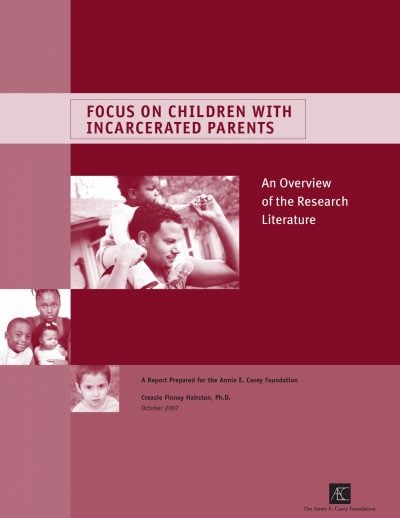Single Parent Majority
75% of parents in prison were divorced or unmarried.

How parental incarceration affects kids, caregivers and prisoners themselves is just beginning to get studied, and the effects aren’t good. While research is scarce, the results are very consistent. From parental profiles to keeping in touch to prison policies, they all play a part in future family bonding.
In general, research confirms that incarceration of a parent is a challenging and potentially traumatic event for children. The arrest and removal of a mother or father from a child’s life forces that child to confront emotional, social and economic consequences that may trigger behavior problems, poor outcomes in school and a disruption or severance of the relationship with the incarcerated parent that may persist even after the parent is released from prison.
The incarceration of a parent may present a more complicated challenge for the child than other types of parental absence because of the added effects of social, community and institutional stigma. Although child development theories are useful in exploring the effects of parental incarceration on children, research is needed to better understand how the effects of parental incarceration differ from other types of parent child separations and other childhood trauma. Studies that compare children of incarcerated fathers and mothers and that provide information on differences for boys and girls, children of different age groups and children from different racial and cultural backgrounds are also needed.
Some research indicates that facilitating and maintaining contact between incarcerated parents and their children can be beneficial to the child and to the family as a whole. However, parents and children may find it difficult to maintain contact during the incarceration period. Divisive factors include: unaffordable collect-call charges for phone calls made from prison; unsympathetic, hostile and restrictive prison visiting policies; remote and hard-to-visit prison locations and strained family relationships. Incarceration can lead to family rifts that do not heal when the parent is released from prison. Social and family pressures, social stigma and institutional policies and practices can make it difficult for parents to re-integrate and re-establish ties with their children.
Focus on Children With Incarcerated Parents concludes with the presentation of key findings drawn from the existing body of research and my own experience and observations, accompanied by policy suggestions and practice guidelines that may contribute to best practices in the future.
For more research related to children of incarcerated parents, check out the following Casey resources:
Over 1.5 million children in the United States have a parent in prison.
We hope you'll find value in this report. We’d love to get a little information from you, which we'll use to notify you about relevant new resources.